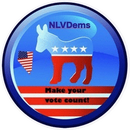North Las Vegas Democratic Club
For Information on our Next Meeting visit
facebook.com/NorthLasVegasDemocraticClub
Check us out on Instagram
www.instagram.com/nlvdems/
Join Our Email List
facebook.com/NorthLasVegasDemocraticClub
Check us out on Instagram
www.instagram.com/nlvdems/
Join Our Email List
Click for the latest information from Whitehouse.gov
The Latest AP Political News - CLICK HERE
The Latest Politico Political News - CLICK HERE
Our Nevada Politicians
|
|
The Democratic Party is fighting for a country where everyone,
from every walk of life, has a shot at the American dream.
from every walk of life, has a shot at the American dream.




